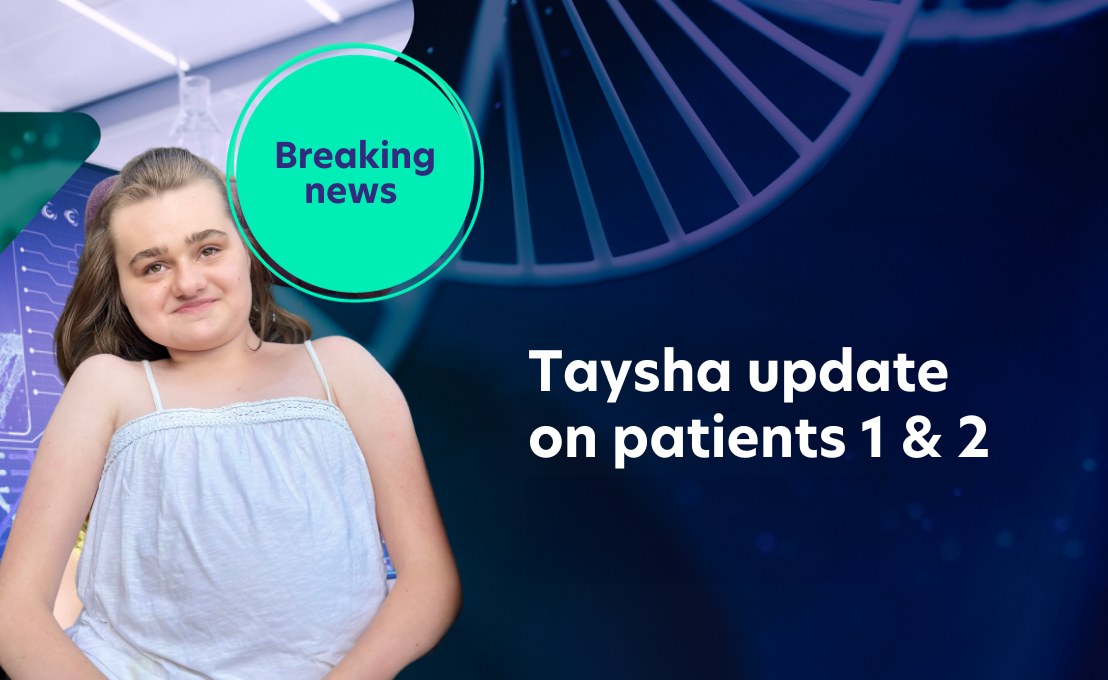Taysha update on patients 1 & 2

On 14th November 2023, Taysha Gene Therapies provided an update on patients 1 and 2 in their adults’ gene therapy trial which is currently taking place in Canada.
You can read the full press release from Taysha Gene Therapies here
As well as providing this detailed press release, Taysha also discussed preliminary findings of the clinical trial in an investor call, followed by Q&A which was held on the same day.
Read Taysha’s letter to patient advocacy leaders here.
Here are our key takeaways from this recent update from Taysha based on all of the above information.
Overall:
- In this first in human clinical trial taking place in adults with Rett syndrome, the main focus of the study is to find out if the product is safe.
- For this reason, the study began with a low dose of the gene therapy. Once three patients have been dosed, the Independent Data Review Committee will review and make a recommendation about increasing the dose.
- At week 12 post-dosing for patient 1 and week 6 post-dosing for patient 2, there have been no serious adverse events and the product has been well tolerated.
- The Independent Data Review Committee (IDRC) have recommended clearance to dose patient 3 which is projected to happen in late 2023/early 2024.
About patients 1 &2:
Although patient 1 and patient 2 both have a clinical diagnosis of Rett syndrome, they are different. Whilst both are described as being in stage 4, the late motor deterioration stage of Rett syndrome, at baseline, patient 1 was unable to sit or stand, having lost those abilities at 8 years old. Patient 2 was able to walk with prompting.
Both patients 1 and 2 have a genetic diagnosis of Rett syndrome. Patient 1 has a large deletion which usually correlates with more severe disease presentation. Patient 2 has a missense mutation which usually correlates with a milder disease presentation.
Both patient 1 and patient 2 have show initial improvements based on data collected from clinician and caregiver reported assessments at 12 week (patient 1) and 4 week (patient 2) timepoints after dosing.
Here is what Dr Elsa Rossignol, M.D., FRCP, FAAP, the Primary Investigator of the Study said:
“The two adult patients dosed with TSHA-102 have different mutations in their MECP2 gene that manifest in different phenotypes and clinical severity. Following treatment, both patients experienced improvement in key clinical domains impacting activities of daily living, including breathing dysrhythmia, autonomic function, socialization, and gross and fine motor skills.
Both patients display significantly reduced breathing dysrhythmia, with less breath holding spells and infrequent hyperventilation, improved limb perfusion and vastly improved interest in social communication and activities.
In addition, the first patient experienced sustained and new improvements, with restored movement in her legs and the gained ability to sit unassisted for up to 15 minutes for the first time in over a decade. Further, her hand function improved with the gained ability to grasp objects with her non-dominant hand and transfer them to her dominant hand for the first time since infancy.
Following treatment, the second patient’s posture, gait and stability improved, resulting in straighter posture and smoother movements when walking. Her hand stereotypies also improved for the first time since regression at age three: she now displays less forceful hand wringing and her hands are often open and relaxed, providing new opportunities for fine motor skill learning. In addition, her seizures are much less frequent.
I’m encouraged by the early positive signals and consistent improvement seen in both patients following treatment.”
-Dr. Elsa Rossignol, M.D., FRCP, FAAP, Associate Professor in Neuroscience and Pediatrics at the Université de Montréal, and Principal Investigator of the REVEAL trial at the CHU Sainte-Justine
What happens next?
The MHRA (UK regulator) response to the Clinical Trial Application for TSHA-102 in children with Rett syndrome is expected before year-end 2023.
Dosing of patient 3 in the adults’ trial will complete dosing in the low-dose group of patients. This is expected to happen in late 2023/early 2024.
Dosing of first US paediatric patient expected in early 2024.
Further updates on available clinical data from all three patients in the low-dose group expected in the first quarter of 2024.
Questions and comments are welcome, please email us directly on [email protected]
Families and caregivers can also contact Taysha Patient Affairs team at [email protected]